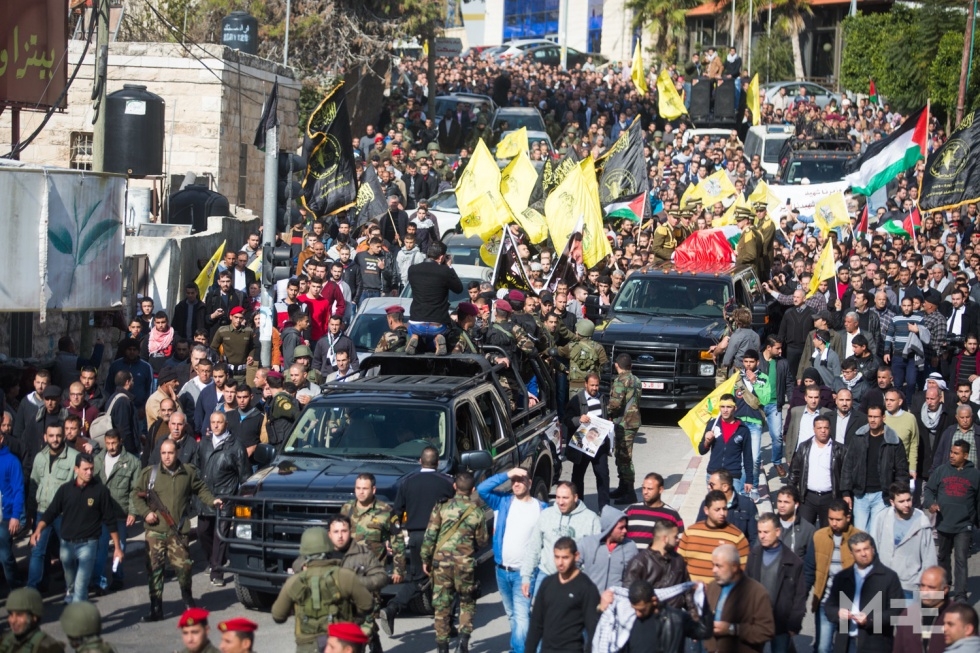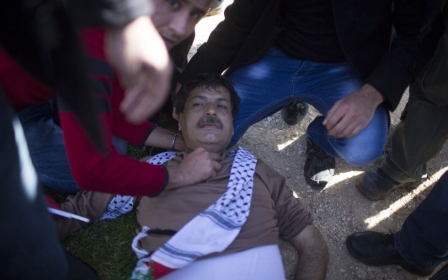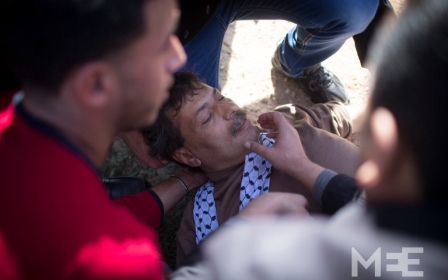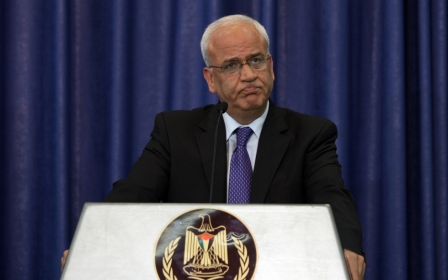Palestinians mourn fallen minister, call for strong response against Israel

Thousands filled the streets, public offices shut down and a sense of sobriety overtook Ramallah on the first of three-days of mourning for Ziad Abu Ein on Thursday. But while Palestinians stood together in grief at the fallen Ministers’ funeral, expectations of a strong response from their leadership may threaten to stoke frustrations and tensions in the West Bank.
The funeral for the 55-year-old Abu Ein, who died Wednesday after being violently assaulted by an Israeli Border Police Officer, was attended by thousands Thursday morning. By midday Ramallah’s presidential compound, the Muqata’a, was packed with an almost silent sea of mourners, craning for a glimpse of a flag-draped coffin flanked by Palestinian Authority (PA) guards. Full military honours were reserved for the Minister, and the funeral, observers noted, was the largest Ramallah has seen in years.
“On a personal level it’s a shock for me, as I know him well. It’s a big loss,” Khalida Jarrar, a leader in the leftist Popular Front for the Liberation of Palestine (PFLP) told Middle East Eye. “It shows the Israeli occupation soldiers continue to assassinate Palestinians. Ziad was demonstrating by planting olive trees. Everywhere, even in this case, it’s easy for the Israelis to kill us, and there is no punishment.”
“We should go immediately to sign the Rome Statute,” Jarrar said of the appropriate response to Abu Ein’s death, in a reference to finalising Palestinian membership of the International Criminal Court (ICC).
“We should stop all kinds of coordination with the Israelis, including security coordination. We also must give an opportunity for people to organise themselves for resistance. And we must, of course, also establish political unity.”
A member of the Palestinian Legislative Council (PLC), Jarrar voiced the demands of the vast majority at the funeral today, which have been made, too, by representatives of all political stripes. Yesterday, Senior Palestinian Security Adviser Jibril Rajoub told journalists the PA had suspended all security coordination with Israel, as a result of what he called the “premeditated murder” of Ziad Abu Ein.
So far, however, the response from the highest level of leadership has been indecisive. Last night, before what was described as a “heated” debate between senior politicians, Abbas told journalists that all options were open for “discussion and for implementation”. But further decisions on whether the PA will attempt to take action through to the ICC or stop security coordination with Israel have been postponed.
“The majority of parties at the meeting believe this should happen,” Jarrar said. “And that includes the President: this is what he said in front of us. But they decided to postpone their decision until tomorrow [Friday]."
“I think that they need to do this immediately. It hope this will happen, but it depends on the leadership,” she continued.
As Abu Ein’s funeral procession made its way to Al Bireh Cemetery this afternoon, men and women of all ages attended, both to pay their respects and demonstrate resistance to an occupation that is exacting an ever-increasing price in deaths, land and oppression in the West Bank. Mourners wore Kuffiyehs – a Palestinian scarf – and held posters commemorating Abu Ein, the most popular of which featured photographs of him from the day he died: first holding an olive tree, then lying on the ground surrounded by concerned protesters.
Most in Ramallah now believe it is indisputable that Abu Ein, who served as Head of the Anti-Wall and Settlement Commission, was killed outright by Israeli soldiers. Israeli and Palestinian sources last night offered differing accounts as to the result of an autopsy, and Israeli authorities have launched an investigation into what happened. But footage of a border police officer grabbing Abu Ein’s neck, and accounts from eyewitnesses, fellow activists and members of the media, have already created a damning, and widely-circulated, narrative. All attest that the protest in the West Bank village of Turmus Ayya, which aimed to plant olive trees on Palestinian land threatened by an Israeli settlement, was entirely peaceful, but was met with tear gas, stun grenades and physical attacks from Israeli soldiers.
“This is not anything new for Israel,” Khaled al Azraq, a former prisoner who spent 29 years in Israeli jails, told Middle East Eye at the funeral. “This shows that the occupation is established on killing the people of Palestine; it has been this way since 1948, since massacres like Deir Yasin.”
Esraa Barghouti, 21, agreed. “This is the Israeli war. It’s the war against the Palestinians,” she said. Attending the funeral with several friends, she had followed the procession to Al Bireh where a large crowd of mourners, carrying banners and Fateh flags, lingered in the sun-spotted graveyard where Abu Ein is now buried. “Is this their land?” she asked. “No: It’s the land of the Palestinian people. But they don’t even think Abu Ein is a human being.”
At what looked to be the biggest funeral to have taken place in Ramallah in years, everyone Middle East Eye spoke to insisted the PA must take swift steps to hold the Israel to account. The Palestinian street, too, is not the only forum to condemn what happened yesterday. International observers – including UN chief Ban Ki-Moon who called it "barbaric" – have condemned Abu Ein's death, and even Israeli leaders have felt compelled to issue apology for it.
Popular resistance leaders, meanwhile, said over the next few days large-scale demonstrations will be held in the West Bank to protest occupation brutality, settlements and security coordination, as well as to urge action on the international stage. After the close of the funeral on Thursday, youths made their way to clash hotspots around Ramallah, perhaps suggesting that these protests have already begun.
But like many in Ramallah today, however, student Lutfi Terawi was cynical about the possibility of a strong response, and particularly the end of security coordination with the Israelis. “There is no way this will happen, because the PA needs this security coordination. If Abbas wants to go to Jordan, for example, he needs a permit from the Israelis,” he said. “Maybe they’ll make it decrease, but they won’t actually stop it. They just want people to calm down. There will be protests now, and for the next few days. But then after that things will go back to normal.”
At al Bireh cemetery this afternoon, community representatives spoke with zeal and passion to the assembled crowd, praising Abu Ein, calling for liberation and condemning the occupation. But to Terawi and young people like him, these speeches have been familiar for decades. The need for President Abbas and the PA take firm action against Israel has been given unique imperative by the death of a minister, but optimism that this action might be taken is not so strong.
“The PA have many agreements with Israel. This limits their movement, it limits what they can do. They need to limit these agreements, and the Government must go to the [UN] Security Council to finish the occupation,” said former prisoner Khaled Al Azraq, as Abu Ein’s family, appearing shellshocked, left the graveyard. “This won’t happen now, and it won’t happen fast. But look at South Africa, which now has its freedom. It will happen after a long time, and after a lot of popular resistance, but it will happen.”
Middle East Eye propose une couverture et une analyse indépendantes et incomparables du Moyen-Orient, de l’Afrique du Nord et d’autres régions du monde. Pour en savoir plus sur la reprise de ce contenu et les frais qui s’appliquent, veuillez remplir ce formulaire [en anglais]. Pour en savoir plus sur MEE, cliquez ici [en anglais].




